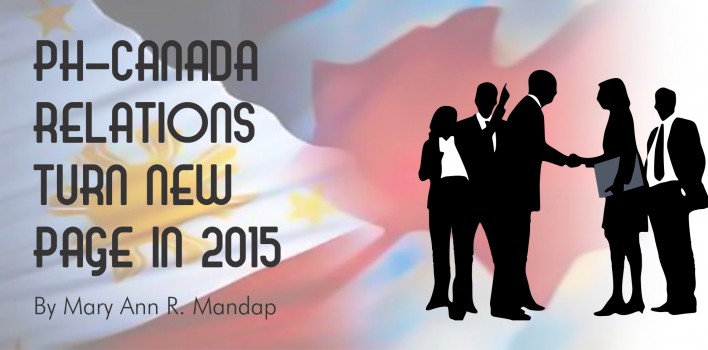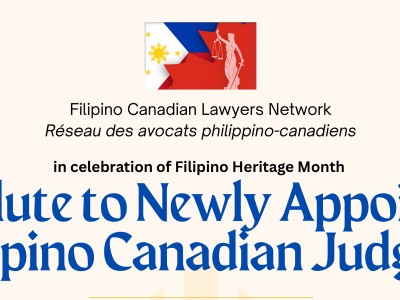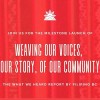PH-CANADA RELATIONS TURN NEW PAGE IN 2015

Bilateral relations between the Philippines and Canada went into high gear in 2015, following a series of recent high-level visits in both directions, which helped to strengthen their links.
President Benigno Aquino III’s state visit to Canada in May 2015 capped a flurry of significant developments during the year. In his arrival statement at the Ninoy Aquino International Airport (Naia) the President said, “the positive fruits of current and incoming Canadian investments in the Philippines will be reaped for generations to come.”
His homecoming package included the following: designation of the Philippines as a “Country of Focus”; declaration of the country as a priority emerging market under the Global Markets Access Plan (GMAP) of Canada; and extension of privileges of Philippine exporters to bring in goods into Canada at reduced tariffs under the General Preferential Tariff (GPT) program.
The two nations likewise updated their Air Service Agreement, preserving distinction of Philippine Airlines, the country’s flag-carrier, as the only Asean carrier to have direct flights to and from Canada.
In November 2015, then newly-elected Prime Minister Justin Trudeau attended the Asia-Pacific Economic Cooperation (Apec) Summit in Manila. The two heads of state had a bilateral meeting on Nov. 18, where Trudeau noted the “tremendous potential for growing trade between two nations,” while Aquino focused on the “strong Philippines-Canada relations” and dynamism of the Filipino-Canadian community.
The two leaders hoped to boost bilateral trade, which is currently a modest $1.5 billion annually.
Aquino thanked Trudeau for making the Philippines a “Country of Focus” or one of the 25 countries that will receive 90 percent of Canada’s Official Development Assistance (ODA), a financial aid program to “reduce extreme poverty, create environments conducive to long-term prosperity and security,” according to Malacanang Palace sources.
The Canadian premier, on the other hand, assured Aquino that Canada would support the Philippines’ possible entry to the Trans Pacific Partnership, a free trade agreement among 12 Pacific Rim nations.
Simultaneously, the two countries are in exploratory talks toward hammering out a bilateral free trade agreement (FTA). Canadian Ambassador to Manila Neil Reeder had told reporters, “Canada has no free trade agreement yet with any Asean member. We want the Philippines to be our gateway in the ASEAN integration.”
This agreement, if finalized, will make the Philippines only the second Asian country, after South Korea, to have an FTA with Canada.
Controversial issues like garbage dumping and environmental repercussions of Canadian mining firms in the Philippines, though remaining as topics of great interest to media, were predictably downplayed during the bilateral meet, in keeping with the Apec spirit of cooperation.
Allegations of hazardous waste dumping have been a sticking point in the otherwise smooth relations between the two countries. The container vans from Live Green Enterprise, a company based in Ontario, arrived in batches at the Manila Port between 2013 and early 2014. They were reportedly misdeclared as plastic scraps but contained non-recyclable plastics and household waste, including adult diapers. Much of the garbage is still in Philippine ports while a few container loads have been dumped in landfills.
Ambassador Reeder earlier said the Canadian embassy was working with a Canadian firm to process the shipment in the Philippines. His government has broadly stated that there is no existing domestic legislation in Canada which obligates it to take back the garbage which has been shipped overseas.
Meanwhile, some Filipino lawmakers have urged the government to invoke the Basel Convention, which was ratified by both countries. Article 9 of the Basel Convention states that, hazardous and other wastes illegally moved overseas should be “taken back by the exporter or the generator, or if necessary, by itself into the State of export” within 30 days after discovery of the “illegal traffic.” The country of origin “shall not oppose, hinder or prevent the return of those wastes.” It remains to be seen how this standoff will eventually be resolved.
Philippines-Canada relations, in any case, certainly go well beyond isolated bilateral disputes. Over the last several years, these relations have been firmly anchored on vibrant people-to-people engagements such as in tourism, education, and labour cooperation.
Filipinos in Canada are highly valued and respected for their exemplary work ethic and their adaptable culture. These traits, and Canada’s welcoming environment, have turned the Filipino community into the fastest growing visible minority in this country, with Tagalog as the fastest growing language.
Meanwhile, Canada’s dependence on foreign labour, primarily Filipino, has never been more evident.
On the sidelines of President Aquino’s visit, the British Columbia government inked the renewal of a Memorandum of Understanding (MOU) with the Philippine Department of Labor and Employment on Human Resources Deployment and Development, with a view to encouraging the entry of more skilled workers to fill in domestic gaps and skills shortages.
Negotiations on a similar agreement are underway in Saskatchewan, which will bring back the number of such MOUs to three, the MOU with Manitoba having been renewed five years ago.
– Mary Ann R. Mandap
 Canada
Canada









